John Wycliffe - Trinitarian Bible Society
John Wycliffe - Trinitarian Bible Society
John Wycliffe - Trinitarian Bible Society
You also want an ePaper? Increase the reach of your titles
YUMPU automatically turns print PDFs into web optimized ePapers that Google loves.
<strong>Trinitarian</strong> <strong>Bible</strong> <strong>Society</strong> – Quarterly Record<br />
Issue Number: 565 – October to December<br />
“...in the end the truth will conquer”<br />
it was deemed such an elementary book to<br />
the proud Latinists of the day that it was<br />
almost beneath their dignity to handle it in<br />
exposition or teaching. <strong>Wycliffe</strong> though,<br />
became enamoured of the Scriptures, and in<br />
his growing practice of reading the <strong>Bible</strong> in<br />
public, and growing confidence in referring<br />
to the Scriptures as a sole authority, he<br />
earned the name ‘Gospel Doctor’.<br />
By 1361 <strong>John</strong> <strong>Wycliffe</strong> was Master of<br />
Balliol College, and when that post had to be<br />
relinquished because of parish obligations<br />
elsewhere, he was appointed as Warden of<br />
Canterbury Hall in 1365. Around this same<br />
time his writings really begin to have the feel<br />
of ‘Reformation’ about them – opposing<br />
indulgences, 9 both in principle and especially<br />
in the peddling of them, and opposing masses<br />
for the dead, again available more easily to<br />
the rich than to the poor. Alongside this, the<br />
determination that the truth of the Scripture<br />
should be widely and soundly preached as<br />
well as read becomes apparent in <strong>Wycliffe</strong>’s<br />
practice. A little later <strong>Wycliffe</strong> distributed<br />
tracts denouncing the secularization of the<br />
church. All of this, inevitably, provoked the<br />
Pope.<br />
<strong>John</strong> <strong>Wycliffe</strong> –<br />
Clerk, Commissioner and<br />
Rector of Lutterworth<br />
Towards the middle of the 14th century,<br />
at the prime of Edward III’s reign,<br />
England was in a relatively strong,<br />
secure and confident position. The naval<br />
victory at Sluys in 1340 had secured the<br />
Channel as English, and victories at Crécy<br />
(1346) and Poitiers (1356) had made her a<br />
power to be reckoned with on the Continent.<br />
From the fifth year of Edward III the annual<br />
papal levy incurred by King <strong>John</strong> had not been<br />
paid.<br />
Then, 33 years on, Pope Urban V demanded,<br />
with menaces, the resumption of this<br />
transaction. Edward, and Edward’s England,<br />
were insulted. Parliament assembled in May<br />
1366, and resolutely denounced and rejected<br />
the demand. In the ensuing paperwork, <strong>John</strong><br />
<strong>Wycliffe</strong> appears as ‘the King’s Peculiar Clerk’,<br />
refuting the claims of the papacy to temporal<br />
jurisdiction, and summarising the parliamentary<br />
debates accepting Edward of England and<br />
rejecting Urban of Rome.<br />
Soon after this, in 1372, <strong>Wycliffe</strong> became<br />
DD. In those days this was a true academic<br />
attainment and quite rare, which strengthened<br />
his influence and reputation. Both the learned<br />
and the common people heard him gladly as<br />
he settled more and more confidently on the<br />
<strong>Bible</strong> and its authority, denouncing the<br />
ecclesiastical world for effectively banishing<br />
the Scriptures and for making the church of<br />
Christ a world power.<br />
The problem of the papal use of nonresident<br />
foreigners to pre-empt English clergy<br />
livings, benefices and appointments, was<br />
addressed by a Royal Commission in 1374. A<br />
hearing with the Roman authorities was to be<br />
held in Bruges, and second on the list of the<br />
English Commissioners was <strong>John</strong> <strong>Wycliffe</strong>. As<br />
a man of outstanding learning and obvious<br />
disenchantment towards the papacy, his<br />
political stock was high. Perhaps not many<br />
had yet seen the ecclesiastical and spiritual<br />
aspects and implications of <strong>Wycliffe</strong>’s course.<br />
From August 1374 to July 1376 Commissioner<br />
<strong>John</strong> <strong>Wycliffe</strong> was in Bruges, where he<br />
concluded that the faults and failings of the<br />
papacy, temporal and spiritual, were more<br />
abysmal than he had ever learned in England.<br />
He also made there a firm friendship with<br />
<strong>John</strong> of Gaunt (Duke of Lancaster, 3rd son of<br />
the King), and on his return to England was<br />
looked on with sufficient favour as to be given<br />
the living of Lutterworth, in Leicestershire.<br />
Opposition Grows<br />
Hostility towards <strong>Wycliffe</strong> was inevitable,<br />
eagerly fomented by the ranking<br />
churchmen in England and<br />
encouraged in every way by the papal<br />
authorities in Europe. In February 1377 he<br />
was cited by the Bishop of London to appear<br />
at St. Paul’s to answer charges against his<br />
teachings. <strong>Wycliffe</strong> duly appeared before<br />
Bishop Courtenay, accompanied in close<br />
friendship and support by <strong>John</strong> of Gaunt and<br />
Lord Percy, the Earl Marshall of England.<br />
These two were not inclined to allow <strong>Wycliffe</strong><br />
to be bullied by a court which had the ground<br />
of its authority not in England, but in Rome.<br />
Only <strong>Wycliffe</strong> remained calm in the uproar<br />
and violence that developed and lasted over<br />
into the next day. Although he was dismissed<br />
with warnings, no formal procedures were<br />
accomplished, and <strong>Wycliffe</strong> went about his<br />
business. His enemies made a selection of<br />
points from his lectures and letters plainly<br />
stating his opposition both to the Pope’s<br />
temporal powers and to the abuse of Spiritual<br />
power. In May 1377 five separate Bulls 10 were<br />
dispatched to England, demanding that<br />
Bishops, University and King should<br />
apprehend <strong>John</strong> <strong>Wycliffe</strong> and detain him at<br />
the Pope’s pleasure.<br />
For a little while nothing happened,<br />
because King Edward III died in June. His first<br />
son, Edward, the ‘Black Prince’, had died in<br />
1376. The crown passed to the eleven-yearold<br />
Richard II, son of the Black Prince,<br />
grandson of Edward III. Richard’s mother was<br />
sympathetic to <strong>Wycliffe</strong>, along with <strong>John</strong> of<br />
Gaunt, 11 affording a continuance of protection.<br />
When eventually Archbishop Sudbury<br />
summoned <strong>Wycliffe</strong> again to appear, this time<br />
at Lambeth in April 1378, the dowager Queen<br />
forbad the bishops to pass censure on him.<br />
Again the defendant alone remained calm,<br />
and 150 years in anticipation of Luther’s justly<br />
famed confession (‘Here I stand – I can do<br />
no other’), <strong>John</strong> <strong>Wycliffe</strong> declared that he<br />
only followed the Scriptures, and if shown to<br />
be wrong by the Scriptures he would retract<br />
his teachings.<br />
Lutterworth Church, Leicestershire<br />
22<br />
23



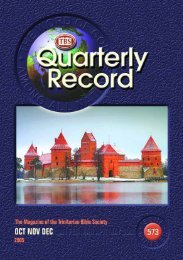
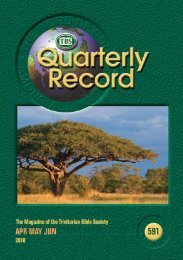
![The Love of the Truth [pdf] - Trinitarian Bible Society](https://img.yumpu.com/49788277/1/184x260/the-love-of-the-truth-pdf-trinitarian-bible-society.jpg?quality=85)
![Bible Word List and Reading Plan [pdf] - Trinitarian Bible Society](https://img.yumpu.com/46882563/1/177x260/bible-word-list-and-reading-plan-pdf-trinitarian-bible-society.jpg?quality=85)
![Click to Download Document [pdf] - Trinitarian Bible Society](https://img.yumpu.com/44904205/1/184x260/click-to-download-document-pdf-trinitarian-bible-society.jpg?quality=85)
![Download Document [pdf] - Trinitarian Bible Society](https://img.yumpu.com/44584740/1/184x260/download-document-pdf-trinitarian-bible-society.jpg?quality=85)
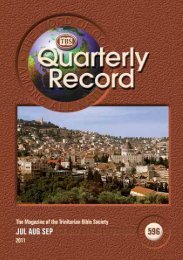
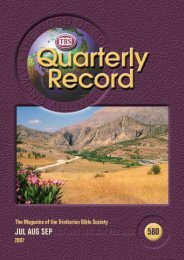
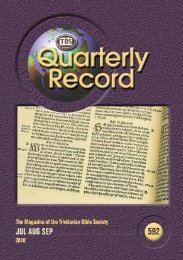
![Download Document [pdf] - Trinitarian Bible Society](https://img.yumpu.com/41007786/1/184x260/download-document-pdf-trinitarian-bible-society.jpg?quality=85)
![Click to Download Document [pdf] - Trinitarian Bible Society](https://img.yumpu.com/40894484/1/188x260/click-to-download-document-pdf-trinitarian-bible-society.jpg?quality=85)
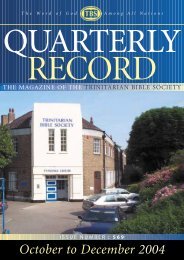
![Download Document [pdf] - Trinitarian Bible Society](https://img.yumpu.com/39425868/1/184x260/download-document-pdf-trinitarian-bible-society.jpg?quality=85)
![Download Document [pdf] - Trinitarian Bible Society](https://img.yumpu.com/39425821/1/184x260/download-document-pdf-trinitarian-bible-society.jpg?quality=85)